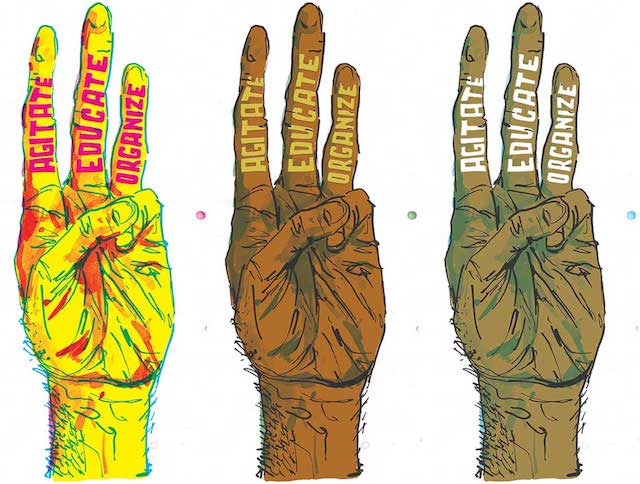Inauguration preparation, deconstructing “Asian America,” cleaning up the mess together, and anti-fascist poetry.

January 20, 2017
We’ve got everything you need to ready yourself for the inauguration and this weekend’s protests—from anti-fascist poems to resources on readying yourself for mass demonstration:
Inaugural Poems curated by The Rumpus
The Rumpus solicited poetry from fourteen poets for today’s inauguration, featuring AAWW pals Rajiv Mohabir, Jaswinder Bolina, and more.
Perhaps the real problem with inaugural poems is that they’re too connected to a moment which celebrates rather than questions or critiques power, and in times like these, where we face governance by people who seem at best uninterested in and at worst hostile to the democratic and social progress this country has made over the last 200+ years, it is our duty as poets to stand as witness and critic.
Yes, Trump Is President. We Can’t Compromise in the Fight Against Criminalization. by Alisa Bierria and Mariame Kaba
Trump’s election is a watershed moment for America, and the ongoing, tireless work of organizers in the fight against state repression and violence will continue on under his administration. Alisa Bierria and Mariame Kaba emphasize the importance of continuing to support this work, and those who are victimized by the state.
On the eve of his inauguration, we think that it’s critical to ask what impact Trump will have on the criminal punishment system—and in particular, on criminalized survivors of violence like Bresha [Meadows]. We must carefully consider how to organize around prison and criminal legal issues in this new context. There will be a scramble to prioritize issues that need our attention and advocacy. It’s important that the experiences of criminalized survivors of domestic and sexual violence not be lost in the shuffle.
Trump: A Resister’s Guide curated by Harper’s Magazine
Harper’s has collected responses from writers, academics and poets on their responses to the new presidency. Friend of AAWW Wesley Yang is featured alongside Sarah Schulman, Corey Robin, Simone White and others.
As a once-unthinkable Trump presidency gets under way, it is time to recognize that we are not as impotent as we may have felt—that even if we cannot destroy Trump, we can resist his primitive vision to the best of our abilities. There are no guarantees that we will succeed, but, as the writers in this forum all make clear, not to try would be a dereliction. A new kind of president demands a new kind of citizen.
I Want to Read at the White House by Joshua Clover
Unlike previous inaugurations, Trump’s will not feature a poet reading their work for the incoming president. Over at Poetry Foundation Joshua Clover shares his poem, “I Want to Read at the White House,” which ends with his own conditions for a reading: “We will clean up the mess we have made together. / All that rubble and all those ashes.”
Sometimes we hear these discussions, “Would you read at the White House, would you not read at the White House?” And for me, that’s not the question. For me, the fundamental question is, “Why have you not lived your life in such a way that it would be impossible for you to be invited to the White House?” That, to me, seems like a fundamental political obligation.
The Power of Deconstructive Politics: Moving Beyond “Asian American” by Sudip Bhattacharya
In a guest post for Reappropriate, writer Sudip Bhattacharya argues for the importance of recognizing the differences amongst Asian Americans in order to form stronger political coalitions as a community.
As we devolve into a modern incarnation of white establishment politics, one that has merged the sensibilities of 1950s-era America with the advent of social media, the easiest and most natural response for us would be to counter through uniting around familiar concepts such as “Asian American” rights and empowerment. However, by doing so without a critical eye, I fear we will lapse into a politics that is neither revolutionary nor liberating.
#SanctuaryEverywhere by the American Friends Service Committee
The AFSC has collected resources for schools, organizations, and individuals on how to create safe spaces for immigrants, refugees, the undocumented, and all those who are at risk under the new administration.
We hope to equip thousands of people with tools and training to interrupt hateful acts and government actions that put our communities at risk, and to encourage policies and practices that promote greater safety and a welcoming environment for all.
Anti-Trump Protest Resources
If you’re going to an anti-Trump demonstration this weekend we’ve collected some relevant links for you:
New York Magazine has an ultimate guide to the Women’s March collected from the March’s organizers.
Justseeds has a searchable collection of images to be printed out and carried in the streets. The AFSC also has posters by artists Micah Bazant and Kate DeCiccio available for download that you can take with you to a demonstration or put up in your community.
The full document of the Women’s March’s Unity Principles is available on their website. Janet Mock, who helped draft the policy table, posted a response on her blog on the inclusion of sex workers.
Jamilah Lemieux shares why she’s planning on skipping the Women’s March on Colorlines.
@3liza on Twitter shared some of their advice for how to deal with the police force at large protests.
And, the late John Berger’s “The Nature of Mass Demonstration” serves as relevant reading for this weekend and our shared future.
Demonstrations express political ambitions before the political means necessary to realise them have been created. Demonstrations predict the realisation of their own ambitions and thus may contribute to that realisation, but they cannot themselves achieve them.
The question which revolutionaries must decide in any given historical situation is whether or not further symbolic rehearsals are necessary. The next stage is training in tactics and strategy for the performance itself.



